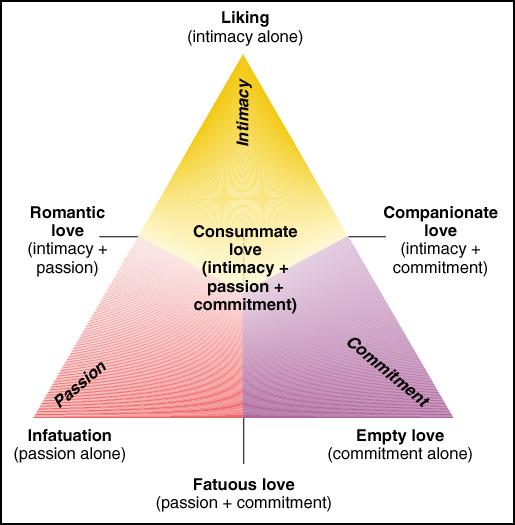Love: If You Give It, You'll Receive It

If you give love, you’ll probably receive love back. Human beings tend to function as a sort of mirror when it comes to exchanges, even with emotions. On the other hand, we tend to be loyal to the principle of reciprocity, as shown in the phrase “today for you, tomorrow for me” or the saying “you owe me one.” In some way, we can owe not only money, but also actions and feelings.
To know a little bit more about love and giving and receiving it, I’d like to focus this article on the psychologist Robert Sternberg, whose triangular theory of love based on interpersonal relationships distinguishes three important components: passion, intimacy and commitment. Components that, following a geometric metaphor, occupy the vertices of this supposed triangle.
A little about Robert Sternberg
Robert Sternberg is a North American psychologist who was born in 1949. He has given classes at Yale University and has chaired the American Psychology Association, to which some of the best professionals in the specialty belong.
Sternberg has based his studies and investigations on human intelligence, wisdom, hate and, of course, love.

The triangular theory of love
Let’s focus now on the triangular theory based on Robert Sternberg’s investigations about this feeling. As we said previously, Sternberg focuses on three components within relationships: intimacy, passion and commitment.
- Intimacy refers to a cluster of feelings capable of promoting closeness, connection and affection towards another person. That is to say, it is linked to the desire to give and share.
- Passion is the state of intense desire for union with a loved one. It expresses needs for romanticism, sexuality ad even excitement.
- Commitment is the intimate decision from each party in a relationship to keep the love alive, whether the situation is positive or not.

Types of love according to Sternberg
If you give love, will you receive love? In the triangular theory of love, Robert Sternberg distinguishes between different types of love, which could also be considered stages or phases. Nevertheless, combinations of two or more stages can occur. So they are not exclusive among each other.
- A lack of love implies that there is no commitment or intimacy.
- Affection creates bonds and closeness, but it doesn’t imply passion or commitment.
- Infatuation is a love at first sight that doesn’t include commitment or intimacy.
- Empty love refers to a commitment to a union, but one which lacks passion and has nonexistent intimacy.
- Romance supposes an emotional union which implies passion, but not necessarily commitment.
- When you lack passion but you do have commitment and affection, that adds up to platonic love.
- If commitment is motivated by passion, Sternberg refers to crazy love, which lacks intimacy.
- Consummate love refers to a type of complete and ideal love. One in which all of the components can be found: intimacy, passion and commitment.
“I love you to love you, not to be loved, since nothing gives me more pleasure than seeing you happy.”-George Sand-

If you give love…
If you give love, it might be a good idea to ask yourself the same questions that Sternberg asked the couples who took part in his study. We have listed them below because surely you’ll find them very interesting and useful in order to study your own relationship:
- Ask yourself how you feel, but you mustn’t forget to ask yourself how you think the person that you love feels.
- As you answer the question about how you feel, think about this: how would you like to feel?
- Another important question that you should never forget is about the feelings you think the other person has, and also about how you would like them to feel.
- Finally, how would you like to feel and how would you like the other person to feel?
Sternberg asked these questions to men as well as women during his study of the triangular theory. He found some answers that, though they were not surprising, were very clearly related to the feelings generated in each of the members of the couples.
“The sign that we don’t love someone is that we don’t give them the best we have within us.”-Paul Claudel-
Results of the triangular theory of love
After asking the previous questions to the male and female members of various couples, the results were very similar in terms of gender, regarding passion, commitment and intimacy. Nevertheless, some small differences could be seen:
- Women desired a higher level of passion in their romantic relationships.
- Although all of the women desired a higher level of the three aspects, interestingly, they were the ones who wanted to improve their ability of commitment to themselves.
Does the triangular theory of love mean that if you give love you’ll receive it? Maybe it doesn’t affirm it out right, but it’s obvious that if you give it, if you offer good levels of commitment, intimacy and passion, it’s very likely that nothing will go wrong within your relationship.
This text is provided for informational purposes only and does not replace consultation with a professional. If in doubt, consult your specialist.








